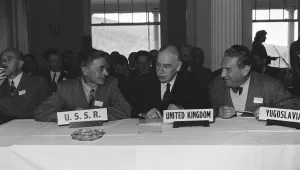International Security is America's leading peer-reviewed journal of security affairs.
Summary
The release of the Barack Obama administration's much-anticipated Nuclear Posture Review (NPR) concluded an intense, yearlong effort to revamp U.S. nuclear weapons policy to better address modern threats. Despite general agreement that the United States' nuclear policy and posture was in need of overhaul, there were strong disagreements over what kinds of changes should be made. At the core of these debates was the issue of U.S. declaratory policy--the stated role and purpose of U.S. nuclear weapons. Whereas some members of the administration advocated that the United States retain all of the flexibility and options afforded by the policy of calculated ambiguity, others contended that to fulfill President Obama's commitment to "put an end to Cold War thinking" and "reduce the role of nuclear weapons in U.S. national security strategy," the United States should adopt a more restrictive nuclear policy such as no first use (NFU), perhaps in the form of a declaration that the "sole purpose" of U.S. nuclear weapons is to deter a nuclear attack. By not adopting NFU, the NPR missed an important opportunity to reduce the role of nuclear weapons in U.S. strategy. The traditional case for NFU hinges on the argument that the threat of nuclear first use is unnecessary for deterrence. Yet the continued U.S. option to use nuclear weapons first is not only unnecessary but dangerous. Given the size and accuracy of the current U.S. nuclear arsenal, and given the variation in the nuclear capabilities of current and potential adversaries, the first-use option risks creating instabilities in a severe crisis that increase the chances of accidental, unauthorized, or deliberate nuclear use. In a future crisis with a nuclear-armed state, the fear--whether real or imagined--that the United States might attempt a disarming nuclear first-strike increases the possibility of nuclear escalation.
Gerson, Michael S.. “No First Use: The Next Step for U.S. Nuclear Policy.” Fall 2010



